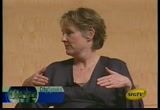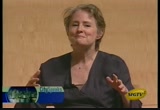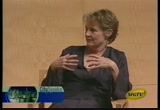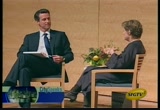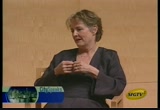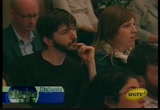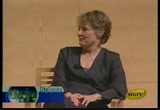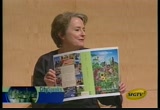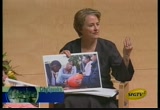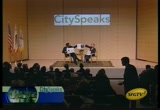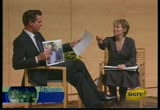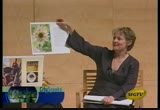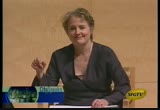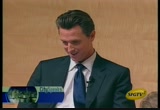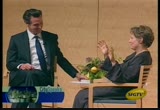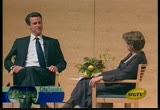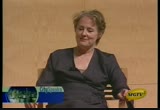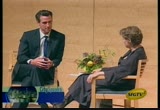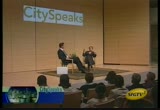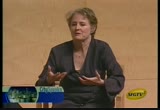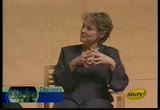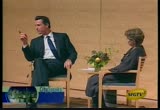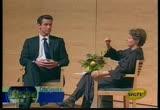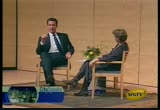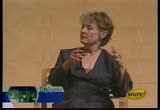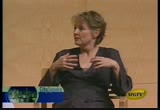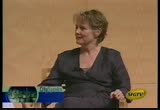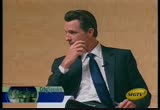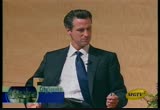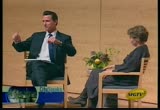tv [untitled] September 19, 2010 8:30pm-9:00pm PST
9:30 pm
foundation. its purpose was to raise money. >> the genesis came from the idea of the edible schoolyard? did the reaction, what was the reaction of the parents? were the parents suspect? were they concerned you were invading on the curriculum? did they think this was a waste of time for their kids? how did people respond? >> we did everything we could bring them into this delicious way of thinking, both the kids and the parents. so we weren't, we used to bring math classes over to chez panisse and feed them lunch. the teachers were having a meeting and i wanted them to
9:31 pm
incorporate these ideas. we had to feed them to them. we invited the principals for dinner and lunch. it was all through drawing them in through a pleasurable experience. once you get hooked, you see, on the flavors, you give very willingly. [laughter]. >> i want to get to soul food in a second. how do you answer? you pick a carrot? what is the education? what is the narrative? >> the math teachers bring their kids out into the garden. >> math? >> math, into the garden, we
9:32 pm
have a couple they decide they are measuring the beds. the kids are having a good time doing this thing because they were in their boots in the grass and picking a couple of ras berries on the way. hands on education is a way to really make an impression and have the education. so they are doing that. they are counting snails. >> counting snails. >> you know, there are so many ways. how many buckets of water does it take to water the bed? it is just very, um -- exciting, kind of process that gets them engaged in the math,
9:33 pm
in the class. you do the same in the kitchen. you are studying geography, in india, finding where the spices come from. pounding them and sprinkling them. >> i can imagine the history and social studies. >> you could be having a language class, it is all in spanish and making the food. it is an english class. >> they are not just cultivating the food, planting the produce, they are actually in a kitchen. >> are there such things as kitchens? >> we took over one of the
9:34 pm
bungalows. we asked an artist to paint it. we recycled and made cabinents. i made it a place where they like to do their homework there. they like to be in the room. they like the smells. it is something that, you know, it feels good like warm bread coming out of the oven. that is something kids miss. some people say 85 percent of the kids don't eat a meal with their family. >> this has caught on in other places than san francisco? >> yes. >> tell us about them. what are the models, now, not just california, certainly not
9:35 pm
just the bay area. >> there are gardens growing everywhere. and there were a long time ago. this isn't anything new. but the idea of connecting the garden to the kitchen to the table and back to the garden again is the whole cycle. that is really transformational and important that we do. that we just don't have one little piece. the whole thing really makes sense. you don't want to have a cafeteria that is inconsistent with the way you are growing food in the garden. >> is it your belief that every public school can and i assume should do this? >> i really believe that.
9:36 pm
when you see this and everybody can come. we have 1,000 visitors a year and over the 12 years, a lot of people have come into the garden. when you see the program and see the kids doing this, you believe every school should be like this. there are montessori schools and all schools in europe and around the world where there is the way the children are fed, food locally produced and food that is ripe and in season. >> you have a book coming out soon, i asked alice if she could share some of the photographs with with you. i couldn't resist the opportunity because you brought
9:37 pm
them with you. they are right here. perhaps you can just show us photos. pictures are the proverbial of 1,000 words. you can see the faces of children that have had the privilege of these schoolyards. >> i want to show you this one picture. you can't quite believe this is, in fact, a real picture. it is not out of the "wizard of oz" [laughter] i'll show you the one that is, this is what it looked like before. that is the before and the after. >> which schoolyard is this? >> king school. and this is king school. this is a beautiful one and
9:38 pm
they are setting the table. >> imagine social interaction and sense of community that this is also a powerful point, working together, partnership? >> the 2 things that are most important, um, i believe, that we have learned from this program, is that when kids grow it, and cook it, they eat it. that is why [laughter] because they have a self-esteem and like to cook for their friends and like to sit at the table and tell stories. they have been missing this in their life. other thing that it is fun. that this is not school in a way, for them, but they are all doing the work of it. they are careful tasters.
9:39 pm
[laughter] they look down under the kiwi, they pick it when it is ripe. these are the bugs in the garden, they know the names of all the bugs and all the edible flowers and know what compost is. this is one of the girls that is collecting the eggs. she is learning about bio diversity by looking in her basket. blue, white, beige eggs. it is an amazing thing. this is another one from the garden. this is the kind, kids don't get up. when they are wondering through
9:40 pm
the rasp berry fields. >> these are kids living in urban areas. >> these are 7th, 8th, and 9th graders with the chickens. that is the important piece, there. >> right there devoted to the viewing of children. right there in the middle of every school day lies time and energy devoted to the feeding of children. to a joyous education, a way of caring for our health, environment, and community. >> this is the bungalow that we transformed. this is the beautiful little moment. this is about socialization
9:41 pm
that happens in the circumstances of the kitchen. we have the piano there, after they finish one of the kids plays while they are cleaning up. that is the ultimate testimony to the congenialties that have inspired by eating together. can you imagine growing something like that? you feel like you have magic, to grow a sun flower that looks that beautiful. and shall i ask you a few questions? >> no. that is my day job. [laughter]. >> 40 years ago, back way then, kennedy, his condition on physical condition. decided we were not physically fit for the new frontier.
9:42 pm
he said we should put physical education into every school in america. and in fact, everybody took that very seriously and we built tracks and gymnasiums and hired teachers and spent a whole lot of money, buying equipment. every child had to take it, part of the core curriculum and got graded on it. >> as you point the finger at me. [laughter]. >> couldn't you just decide we are going to have a core curriculum here? >> where are our school board members? are they here? >> every single child was going to eat food locally produced, unsustainable? there would be a criteria for
9:43 pm
buying the food for the schools. by investing in the schools, you are transforming the agricultural around san francisco? >> [applause]. i love -->> you love what? >> i love the idea. is this part of the discussion with the debates we were heard about, other important issues, i confess, i haven't heard much about a curriculum. i do reference and do enjoy, no other reason to read these books, alice has a couple of books, the one with you are seeing right there. the wonderful in this book, it is about alice.
9:44 pm
written by alice, a wonderful give and take between then president clinton and then herself, where she simply refused to take no for an answer. as it relates to a desire to do just this. did you make any progress? >> we have a great hope. i am counting on the victory garden that it is intended to be planted here. >> tell me about the victory garden? >> we are going to have this big event in september. >> that brings us to slow food. >> that does bring us to slow food. >> i confess, i have been talking about the slow food conference we are having labor day weekend, so september, people are like what the heck
9:45 pm
is slow food? i know what fast food is. what is slow food? and what is slow food nation? and what is this conference you are bringing to america? >> and what do you say? [laughter]. >> i look for inspiration straight from you, read one of alice's books. >> what do you say? >> i will be asking the questions. [laughter]. slow foods, does that mean produce slowly cooked? something that took along time to get to the table? slow foods? >> slow food is um, slow food is a way of thinking. and um, thinking about the world. and it is an international
9:46 pm
movement started by a guy named carlo petrili in rome, italy. he thought it was more effective than holding up signs and saying, don't put that in here. he sat down with all of his friends, they ate pasta and drank wine. he wented a whole other way of eating and drinking and dreamed up this idea of bringing people the ideas of sustainability and diversity. and the preservation of the cultural heritage of the world through this idea of, of flavor
9:47 pm
and [inaudible] at the table. >> he holds international conference every year? >> every 2 years. >> in italy? >> in italy. >> he has been doing that for how long, a decade or so? >> 12 years. >> and you are bringing it to the united states of america? here in the great city and county of san francisco? and your idea is to do what? and what should we expect? why should we show up at slow food nation? food demonstrations? farmers. >> victory garden.
9:48 pm
well,>> what is this conference to you? what are you expectinging to get out of it? >> who is presenting? how many people are going to participate? why is it so important that everyone here and everyone watching at home participate in this? >> it is important that we see who is here, who is in this country? who believes in this set of values that we are talking about and we are empowered by that. it was something amazing going to italy, to the event they call taramadre. they have 5,000 farmers from 131 countries come. everybody looked at each other, they said oh, we all understand this. we are all here because we care
9:49 pm
about the land. it lifted us all up. this country is so huge. there are little pockets of people doing amazing things across this country. we want to bring them together to meet each other. what better meeting place than san francisco? because we have the beginnings. we have been working with farmers for a long time. it is not just people who care about food and farming, it is everyone eats. it is their common language. and we have to understand what the consequences of the decisions we make are, and that is what this event will help us to understand. >> and the decisions we make in
9:50 pm
what we put on our table, what our eating habits are. >> when i put food on the table, i am giving my money directly to the people supporting the land. i want to give them extra money because they are so important to me. that is the kind of connection we have to make. that is when it becomes, environmentalism becomes real. otherwise, it is abstract. and when you are eating, you are connected, you are digesting these ideas, you realize where your food comes from. you think about the food in a different way. this is the way to build a community, too. a beautiful way. i am dependent on this guy, he is giving me what i need for my restaurant. >> later this year, in july,
9:51 pm
hosting urban world partnership, to connect urban areas to the stronger way, again, talking, interdependence that we all share and have in common. this is an important topic just beginning to develop traction. i don't know if you know this, alice, i am asking you, as much as i am stating it, the average meal travels 1800 miles to your plate, could that be possible? >> that could be possible. >> from one part of the country to the next, the larger context to our global climate change. >> a number of years ago i was
9:52 pm
in celina kansas, he was just opening this little restaurant, a little cafe out there. they were asked to figure out the mileage of every food and mark it on a map. you couldn't believe. i mean, ones that made a trip from kansas to europe and back to kansas. it is a whole education we need to learn about. you were talking about best practices, that is something we hope we'll be able to share at this event. that somebody, the mayor told
9:53 pm
me that in china they followed suit. i had no idea. there are all kinds of ingenious ways people have figured out how to live in a more sustainable way. we need to know about them. i want to get to 2 final questions and i want to bring up your questions. that is the idea i hear often times expressed in opposition to this whole slow food movement, it is an elitist movement. it is a movement for the haves, we simply can't afford it. it is great for you and all of those folks out in the bay area, for the rest of us on fixed income, this doesn't work.
9:54 pm
>> i think that good, wholesome food is a right for everyone in the country. it is the reason we want to feed every single child at school. and i don't mean that kids come and buy their food at school. i am talking about feeding children a breakfast, a lunch, and an afternoon snack. they pay up front instead of out back. we all know the food is expensive. not only to our healthy environment, and particularly to our culture. we are wanting everything to be fast, cheap, and easy. when you think about music, and architecture and art, everything has to be fitting into this kind of way of thinking.
9:55 pm
and it is what is destroying the world and taking the beauty and the meaning out of it. so we are saying that this is something of great value and you have to make the different kinds of decisions. right now we want to buy 3 pairs of nike shoes rather than spend it at the farmer's market and feed our children. it is a matter of choice. you have to learn about it. the biggest impediment is the price of food and people accepting this. we have to figure out different ways to talk about it. i hope it is one of the important conversations that happens at slow food nation. i have been working at neo university for the last 6 years. believe it or not, money is an
9:56 pm
issue for them at yale. not because they don't have the money to spend. but so indoctrine nated that food should be cheap, when the caterer says [inaudible] they don't want to pay it. it is not supposed to be that expensive. it has to be this kind of engagement. i think everybody should go out and try to grow food. [applause]. >> just put it in perspective, the cost, i don't think most people know. it is interesting, i don't want to do an audience quiz, venture
9:57 pm
to guess what we allocate in terms of federal dollars, 53 percent of san franciscans kids are eligible for free lunch program. they can't afford, so we subsidize it. a meal at lunch, at our school district is budgeted at $2.68 of which $.21 is from the state. one of the budget cuts proposed from 21 cents to $.19. a $.99 hamburger is netted
9:58 pm
out, it ends up in obesity in your emergency room, in inactivity, lack of work place, it ends up reducing gep. is that an argument beginning to take shape? an argument having an impact, the actual costs not the [inaudible] costs? >> absolutely, the school in oakland, they identify 4,000 kids at risk for obesity. their clinic can only take care of 150. that is the handwriting on the wall. you know, all of our health insurance goes up and up and up. >> and will unhappily pay those premiums because we have no
9:59 pm
choice, then we are outraged when someone says we have to invest a little more. i tried this in one of our homeless shelters. i had my department folks say we can't afford this. we had a conversation with carlos. i said this is the best idea, get it into a homeless shelter. don't get me wrong, we improved the food, x number of percentage comes from sustainable sources, etc. but it is not the real deal. the argument is cost. even in san francisco, we are not giving up. it remains an on going challenge. we have gotten salad bars in our schools [applause]. a few questions, here.
67 Views
IN COLLECTIONS
SFGTV2: San Francisco Government Television Television Archive
Television Archive  Television Archive News Search Service
Television Archive News Search Service 
Uploaded by TV Archive on

 Live Music Archive
Live Music Archive Librivox Free Audio
Librivox Free Audio Metropolitan Museum
Metropolitan Museum Cleveland Museum of Art
Cleveland Museum of Art Internet Arcade
Internet Arcade Console Living Room
Console Living Room Books to Borrow
Books to Borrow Open Library
Open Library TV News
TV News Understanding 9/11
Understanding 9/11